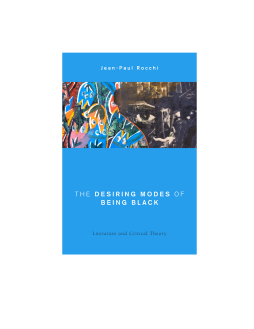
Additional Information
Book Details
Abstract
A critique of theory through literature that celebrates the diversity of black being, The Desiring Modes of Being Black explores how literature unearths theoretical blind spots while reasserting the legitimacy of emotional turbulence in the controlled realm of reason that rationality claims to establish. This approach operates a critical shift by examining psychoanalytical texts from the literary perspective of black desiring subjectivities and experiences. This combination of psychoanalysis and the politics of literary interpretation of black texts helps determine how contemporary African American and black literature and queer texts come to defy and challenge the racial and sexual postulates of psychoanalysis or indeed any theoretical system that intends to define race, gender and sexualities.
The Desiring Modes of Being Black includes essays on James Baldwin, Sigmund Freud, Melvin Dixon, Essex Hemphill, Assotto Saint, and Rozena Maart. The metacritical reading they unfold interweaves African American Culture, Fanonian and Caribbean Thought, South African Black Consciousness, French Theory, Psychoanalysis, and Gender and Queer Studies.
Investigating the theoretical uses and limits of Freudian psychoanalysis, existentialism, phenomenology, deconstruction, and queer theory, Rocchi's Desiring Modes of Being Black disentangles the entrenched entanglements binding race, gender, sexuality, and nationality across vast postcolonial geographies. Framed by poignant Baldwinian self-meditations, Rocchi’s readings of James Baldwin, Melvin Dixon, the South African writer Rozena Maart, and 1990s North American AIDS memoirists, black and white, are methodologically experimental, analytically rigorous, and theoretically exciting. A rich collage of supreme intelligence, this book will conjure an attentive, engaged audience, whose premises about racial and sexual identities will be rattled and disrupted into thoughtful new directions.
Marlon B. Ross, Professor of English, University of Virginia
Jean-Paul Rocchi is Professor of American Literature and Culture at University Paris-Est Marne-la-Vallée.
The Desiring Modes of Being Black is an archeology of desire and blackness. Rocchi pronounces a method of un-writing identity in texts only to interrogate its absences. The welcomed transdisciplinary approach exposes a critical, nuanced re-thinking of Baldwin, Dubois, race, sexuality, psychoanalysis, and others to advance a comprehensive frame to engage with performing blackness. Rocchi’s arguments are enhanced by his thoughtful and incisive writing, which makes the text desirable.
Myron M. Beasley, Associate Professor of African American and American Cultural Studies, Bates College
The Desiring Modes of Being Black is a nearly impossible thing. At its heart a mapping of a precious space of struggle and inter-locution between Europe, Africa, and America, this book offers inspired readings of key texts and contexts, suggesting that even within the more progressive precincts of African Diaspora Studies we continue to remain trapped within intellectual and discursive silos that posit an artificial distinction between the works of Sigmund Freud and James Baldwin, the AIDS literature of African American men and the ideological complexities of the South African Black Consciousness Movement. In their place, Jean-Paul Rocchi introduces the desiring black subject whose longing opens new and radically innovative pathways to bold yet subtle critique.
Robert F. Reid-Pharr, author of Archives of Flesh: African America, Spain, and Post-Humanist Critique
Table of Contents
| Section Title | Page | Action | Price |
|---|---|---|---|
| Contents | 9 | ||
| Foreword | 11 | ||
| Acknowledgments | 15 | ||
| Introduction | 19 | ||
| 1 The Other Bites the Dust | 41 | ||
| 2 The Making of a Man | 67 | ||
| 3 Dying Metaphors and Deadly Fantasies | 81 | ||
| 4 Desire as “E mag e nation” | 109 | ||
| 5 “The Substance of Things Hoped For” | 125 | ||
| 6 Writing as I Lay Dying | 137 | ||
| 7 The Word’s Image | 159 | ||
| Notes | 171 | ||
| Bibliography | 179 | ||
| Index | 191 |
